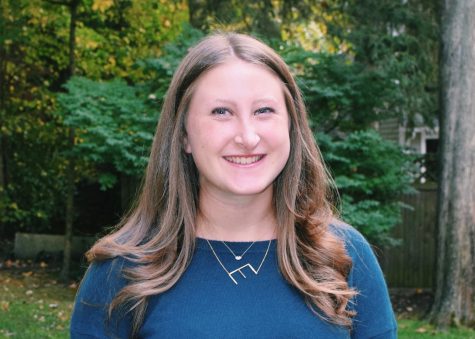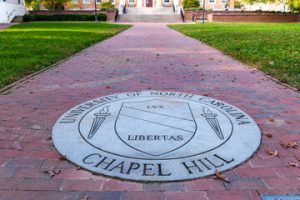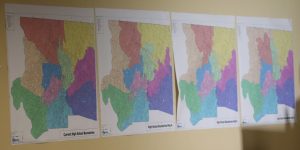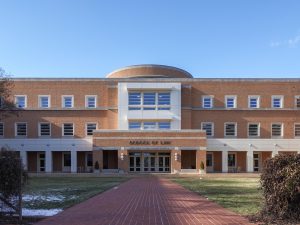Professor reflects on power of protests
September 10, 2020
This summer, Americans watched in awe of the events that unfolded following the death of George Floyd, which prompted a resurgence in the Black Lives Matter Movement. Protesters gathered in large numbers, often clashing with police, to chant the names of the fallen: Breyonna Taylor in Louisville, Rayshard Brooks in Atlanta, George Floyd in Minneapolis and then John Neville in Winston-Salem.
While many Wake Forest students and community members organized and participated in Black Lives Matter protests in their own communities during remote learning, Dr. Brittany Battle, an assistant professor in the university’s sociology department, has been a critical actor in the fight for racial justice in Winston-Salem.
Battle describes herself as a scholar-activist, teaching courses like “Social Justice in the Social Sciences,” which outlines ways that activism and commitments to justice work appear in sociology and other social science disciplines.
“They can’t be separated for me. My scholarship and my role as an academic and my activism, they’re completely intertwined,” Battle said.
Early in the summer, Battle began working with the Triad Abolition Project, an organization that focuses on abolishing the carceral system and educating people about the historical development of different policing policies and procedures. The group successfully petitioned against Senate Bill 168, which would have made all death records completely confidential for those who die while incarcerated had it become law. But after a July 8 press conference that announced the charging of five police officers and one nurse with involuntary manslaughter in relation to Neville’s death on Dec. 4, Battle and the organization shifted their focus.
“Many of us were just disgusted by the press conference that the District Attorny (DA) [Jim O’Neill] and the Sheriff [Bobby Kimbrough] held. The ways that they talked about the people involved in Mr. Neville’s death being ‘good people,’ for me that was horrifying,” Battle said.
Neville died four days after Kernersville police arrested him on a misdemeanor charge of assault on a female. Doctors at Wake Forest Baptist Hospital found that Neville had a brain injury after suffering an apparent seizure in his cell. The brain injury was apparently caused by officers placing him in a prone restraint, a controversial restraint technique.
“For DA O’Neill during that press conference to also threaten to prosecute peaceful protesters in Winston and put us basically in the same sentence as the people who were just charged with involuntary manslaughter, it was just unbelievable for him to say.”
According to Battle, Black Lives Matter of Winston-Salem called for an emergency rally outside the Forsyth County Sheriff’s office after the press conference. She recounts that relations between protestors and police took a violent turn following the press conference, and that police responded to protesters using large canisters of pepper spray, long range acoustic devices (LRAD) — which can cause deafness — and zipties to arrest protesters.
“Winston-Salem police and our elected officials were marching alongside us and participating in marches all summer until we started protesting about something that happened here, and it seems very clear to me that they were trying to intimidate us away from shining a light on what happened in Forsyth County Detention Center,” she said. “It was fine when we were saying the names of Breyonna Taylor and George Floyd and Ahmaud Arbery and Tony McDade, but when we started to say the name of John Neville, people got very afraid.”
Later that night, Battle was arrested by two officers on charges of impeding traffic, along with three other protesters. She said that the “impeding traffic” charge was historically used to target freedom fighters during the civil rights movement.
“There is one picture of me being taken across the street and there are at least three other people in the street and none of those other three people were arrested.” She notes that some of these protesters were non-Black and were not affiliated with the leadership of any of the participating organizations.
According to the Winston-Salem Journal, police rode around during the protests warning people that they could be arrested for impeding traffic or illegally blocking city streets. But Battle describes being genuinely shocked that she was arrested, since she was not in the street. She recounts pleading for them to let go of her wrist because she felt they were going to break her arm. Immediately after she was released, she went to the emergency room.
“It’s now over two months since it happened and I’m still in physical therapy. I still have to wear a wrist brace,” she said.
As established leaders and vocal activists, Battle believes she and the other protesters were targeted and that their arrests were intentional. But Battle expressed that the sociology department has been very supportive of her work and released a statement on July 12 after she was arrested.
“Several administrators reached out to me directly to offer support, to make sure I had legal counsel and to just say that they were standing in solidarity with the work that I was doing,” she said.
Following several days of intense protests, the Triad Abolition Project, in partnership with the Unity Coalition staged Occupy WSNC, which lasted 49 days. It concluded after the group’s two demands were met by the Forsyth County Sheriff’s office: banning the bent-leg prone restraint, the maneuver that led to Neville’s death and ensuring the Sheriff notifies the public when any incarcerated individual dies in custody.
“We were definitely proud to have had the demands met because I think having those two demands met makes Forsyth county a little safer for us all,” she said. “But we know that the world of abolition is a long-term project and that we just have to continue to chip away at the institutions which reinforce white supremacy and racism and racial inequality.”
Battle also noted that after spending more than 49 consecutive days together protesting and occupying Bailey Park in downtown Winston-Salem, the participants developed familial bonds. She enjoyed watching her fellow protestors learn more about civic engagement and government.
“I have said many times that the way that we developed our movement was for it to be multidimensional,” Battle said.
To achieve this objective, the occupation hosted several educational programs on social justice featuring professors from the university, including Dr. Derek Hicks, Dr. Andrea Gómez Cervantes from the sociology department, K. Monet Rice-Jallah, former assistant chaplain and J. Mai, who is the graduate assistant with the LGBTQ center and a student in the School of Divinity. The group also welcomed musicians, held marches and vigils and hosted massousts and yoga instructors, who helped the group focus on self-care during their long days at the occupation.
But now that the occupation has concluded, Battle looks forward to continuing her work with the Triad Abolition Project. She also weighed in on how the university can actively combat racial injustice and reconcile with its controversial history.
“Understanding that our original endowment was built on the sale of enslaved Africans and engaging with that history through the Slavery, Race and Memory project is really a good start for the type of reflection that Wake needs to do,” Battle said. “The next step comes with actual action.”
Battle outlined several concrete ways the university is working to improve race relations on campus, including developing an African American studies department, which will be headed by Dr. Cory Walker.
“If we understand that we have been complicit in upholding white supremacy, then we have to devote resources to dismantling white supremacy,” she said.















